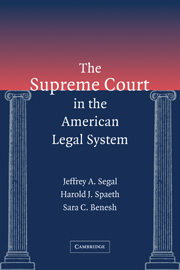6 - Criminal Procedure
Published online by Cambridge University Press: 05 June 2012
Summary
The Constitution set few limits on federal criminal procedure, and fewer still on that of the states. Thus, Congress could not suspend the privilege of the writ of habeas corpus – the right of individuals under detention to have a judge determine the legality of their imprisonment – except in cases of rebellion or invasion, and federal criminal trials had to be by jury. The crime of treason was defined, with evidence needed to convict (two witnesses to an overt act) and restrictions on inflicted punishment (limited to the life of the traitor) specified. Neither Congress nor the states could pass bills of attainder – legislative acts that single out individuals for punishment – or ex post facto laws (i.e., laws that make behavior criminal after the act was committed or increase punishment after sentencing). States were required to extradite alleged criminals and return fugitive slaves.
Passage of the Bill of Rights sharply increased these meager limitations. The Fourth Amendment prohibits unreasonable searches and seizures. The Fifth guarantees the general right to due process and the specific right to indictment by grand jury. It also prohibits double jeopardy and compulsory self-incrimination. The Sixth Amendment provides for the right to trial by jury in criminal cases and the right to compel testimony, confront witnesses, and have assistance of counsel. Finally, the Eighth Amendment prohibits excessive bail, excessive fines, and cruel and unusual punishments.
These constitutional protections, however, originally limited only the national government.
- Type
- Chapter
- Information
- The Supreme Court in the American Legal System , pp. 119 - 144Publisher: Cambridge University PressPrint publication year: 2005



